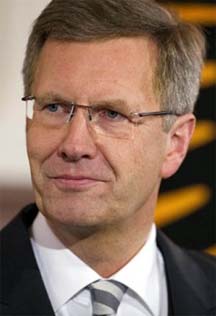BERLIN (Reuters) – Angela Merkel’s hand-picked choice for the ceremonial post of president resigned yesterday in a scandal over political favors, dealing a blow to the German chancellor in the midst of the euro zone debt crisis.

In a curt five-minute statement at the Bellevue presidential palace, Christian Wulff acknowledged that he had lost the trust of the German people, making it impossible to continue in a role that is meant to serve as a moral compass for the nation.
“For this reason it is no longer possible for me to exercise the office of president at home and abroad as required,” said Wulff, standing next to his wife Bettina.
The search for a successor to Wulff could become a distraction for Merkel at a time when her government is embroiled in tough talks on a second bailout package for Greece, although analysts said they expected any impact on the negotiations to be limited.
Merkel postponed a trip to Rome, where she was to hold talks on the debt crisis with Italian Prime Minister Mario Monti, to deal with the fallout from Wulff’s departure.
She made a brief statement after his announcement, saying she regretted his departure and would seek talks with opposition parties to find a candidate to replace him.
The chancellor is riding a wave of popularity in Germany for her handling of the crisis, but the departure of Wulff raises questions about her judgment because she forced through his appointment in 2010 over a strong opposition candidate most Germans favoured.
He is the second president to step down in less than two years. His predecessor, former International Monetary Fund chief Horst Koehler, resigned unexpectedly after coming under fire for comments he made about the German mission in Afghanistan and failing to get strong backing from Merkel.
The resignation is likely to embolden the opposition Social Democrats (SPD) and Greens, who have shied away from criticizing Merkel too strongly in recent months.
Despite her vow to find a consensus candidate to replace Wulff, the choosing of a successor could prove divisive at a fragile time for Europe. Greece needs the new aid deal to avert a chaotic default that could push it out of the euro zone. Berlin is playing a decisive role in shaping the package.
How much of a distraction the Wulff saga becomes depends on how fast a successor can be agreed. A vote in the 1,244-seat Federal Assembly must take place within a month, or by March 18.
“This won’t be without consequences for Merkel, her reputation will suffer from it,” said Gerd Langguth, political scientist at Bonn University.
Carsten Brzeski, an economist at ING, said the resignation was unlikely to have an impact Greek bailout negotiations.
“However, domestic political pressure on Angela Merkel could increase again and will not make her life any easier,” he said.
